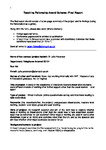A study of the experience of Education Masters dissertation students; could different models of working offer further support other than the usual student – tutor dyad?
| dc.contributor.author | Anderson, Julie | |
| dc.contributor.other | Faculty of Arts & Humanities | en_US |
| dc.date.accessioned | 2018-08-17T08:55:48Z | |
| dc.date.available | 2018-08-17T08:55:48Z | |
| dc.date.issued | 2014 | |
| dc.identifier.uri | http://hdl.handle.net/10026.1/12165 | |
| dc.description | File replaced (incorrect version) on 18/7/22 by KT (LDS) (1.4) | |
| dc.description.abstract |
My research question and aim of the work was to explore whether ways of working on dissertations other than the usual face to face supervisor–student dyad may be beneficial for our students? Other ways of working are used in some other disciplines (Egan et al. 2009) and countries other than the UK, and so the question and aim was whether other ways could also be useful for us. In most European countries the final assessment in a master’s degree programme is the master’s thesis (Meeus, van Looy, and Libotton 2004) or dissertation. Research supervision has conventionally been conceptualized as an individual activity in the humanities and social sciences, and the literature has to a great extent focused on the supervisor–student dyad (Dysthe, 2006 p 299). Other studies support this assertion (Anderson, 2007; Kirton, 2011; Pilcher, 2011). This is not just in the UK either for in other countries “…master’s students traditionally have one supervisor who guides them through the process of their research in a more or less one-on-one relationship" (Renske A.M. de Kleijn, 2012, p926) Most of our Education mature students returning to study part time at master’s level - are still working full time as school, college and academy teachers. This therefore also creates its own pressures and in particular isolation could be an issue reported by some (IMP student feedback data). I therefore wanted to see if we could offer other ways of working over and above the usual student tutor dyad that could support those that wanted it further. | en_US |
| dc.description.sponsorship | TFAS | en_US |
| dc.language.iso | en | |
| dc.publisher | University of Plymouth | en |
| dc.subject | postgraduate dissertations; masters level working; student- tutor dyad; group and peer working | en_US |
| dc.title | A study of the experience of Education Masters dissertation students; could different models of working offer further support other than the usual student – tutor dyad? | en_US |
| dc.type | Report | en_US |
| plymouth.date-start | 2013-2014 | en_US |


